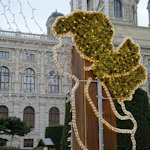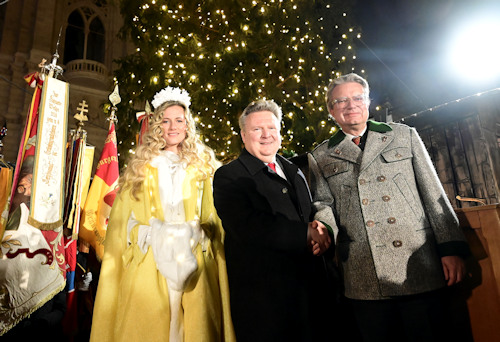
There’s a battle on (sort of) for the hearts and minds of the children of Austria.
Not Playstation against the Xbox. Or TikTok versus Instagram. No, it’s Santa Claus in a fight to the finish with the Christkind.
- See also:
Marketing versus tradition

(Switching on the festive lights of the Christmas tree at the opening of the Wiener Weihnachtstraum on the Rathausplatz square in 2022. Vienna’s Mayor (Michael Ludwig, middle) and the Governor of Styria (Christopher Drexler, right) are joined by the 2022 Christkind, a position filled every year in the city; press photo © C. Jobst/PID)
In predominately Catholic Austria, the Christkind (Christ child) traditionally brings the gifts at Christmas. They even feature in some Christmas market names, like the well-known Christkindlmarkt in front of Vienna’s city hall (see here for more on market terms).
Portrayals of the Christkind commonly feature a young child dressed in brilliant white or gold. The Christkind character that often accompanies seasonal markets or Christmas events tends to be a young woman with long (blonde) hair and also clothed in white and gold.
The imagery and spiritual or religious association of the Christkind doesn’t lend itself easily, however, to modern commercialism or today’s marketing and advertising requirements.
Enter Santa Claus or Father Christmas. Now, there’s a nice, flexible, non-religious Christmas brand you can plaster across your product packaging.
Sensing their chance, companies across the land started using Santa Claus in their Christmas marketing materials, boosted in part by the help of non- (or decidedly anti-) religious groups.

(Vienna’s Mayor, Dr Michael Ludwig, introduces the Viennese Christkind back in 2018; press photo © C. Jobst/PID)
This led to a bit of a cultural debate about just who should be pitched as the bringer of gifts in Austria.
Things first came to a head way back in 2004, with both sides firing salvoes at each other via the media in an intensive effort to settle the issue one way or another.
These days (my perception), an uneasy truce exists as marketers seem to have shifted to more neutral imagery for advertising and packaging…like snowmen, reindeer, bells, and similar.
The Christkindlmarkt has certainly come down firmly on the side of traditionalists: 2004 saw the election of the first “Wiener Christkindl” (Vienna Christ Child) and that established concept is still going strong in 2023.
(Personally I think it’s the parents that bring the presents, but what do I know?)